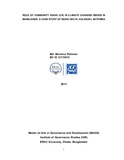Role of Community Radio (CR) in climate changes issues in Bangladesh: a case study of Radio Nalta, Kaligonj, Satkhira

View/
Date
2013Publisher
BRAC UniversityAuthor
Rahman, Md. MominurMetadata
Show full item recordAbstract
Community radio is well recognized as a powerful vehicle for advocacy and social
change in Bangladesh, but its use in the field of climate change has remained very
limited. This dissertation discussed the role of Radio Nalta in climate changes issues in
Satkhira district and the impacts of climate change on vulnerable communities in
Satkhira. It also discussed in climate justice initiatives more broadly. Most initiatives
linking Nalta Radio and climate change in developing countries currently focus on
delivering information and messages to listeners about short and medium-term forecasts
for farmers, alerts for extreme weather events, and messaging to discourage behaviour
which degrades environmental assets. Nalta radio is broadcasting few programmes in 17
km from the station but 74% of listeners agreed the station is playing good role in
awareness creation among the people about temperature rise. Highest 87% people believe
that Radio Nalta is helping in very good way to create awareness among the people.
About 65% listeners agreed that the Nalta Radio is playing good role in awareness
creation about salinity in the locality. Radio Nalta is playing very good role in creating
awareness among the people and 83% people believe it. 78% people seem that Radio
Nalta is playing good role in increasing soil fertilely while 82% listeners believe that it is
playing very good role in awareness creation about river erosion among the listeners. But
in case of overall performance Nalta Radio is playing good (78%) role in awareness
creation among the listeners about climate changes issues in Satkhira District. Before
launching Radio Nalta the listeners had little knowledge about climate change issues but
the scenario is changing gradually. The quality and subject matter of the programmes of
radio Nalta is good but the broadcasting time of climate change related programmes is not
suitable for the relevant listeners. But the listeners have scope to give feedback about
programmes through letter, telephone, mobile phone and short message service (SMS). It
is also mentionable that the radio authority is broadcasting the programme in local
language and they are trying to disseminate the information about climate change related
programmes through advertisement.
